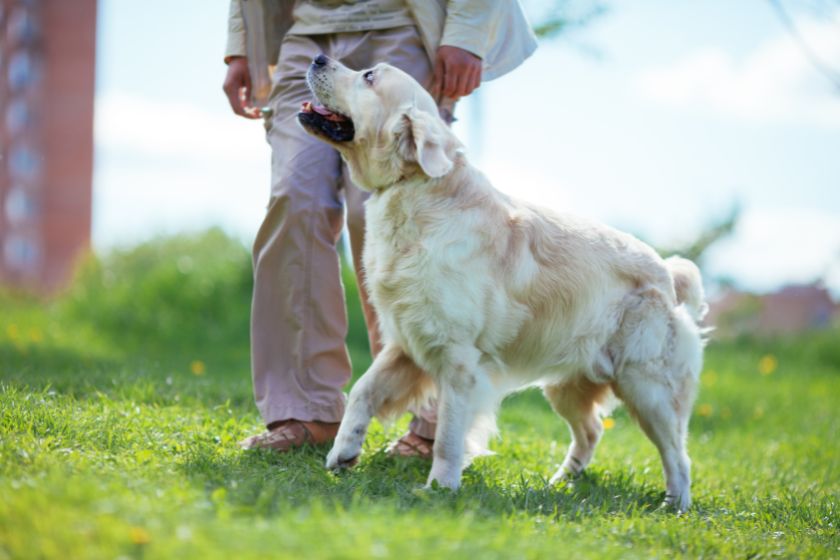
It doesn't matter whether you're trying to resolve a behavior problem, or if you simply want your dog behave well, you can teach them to sit, come, stay, and come when asked. These behaviors will help your dog be more responsive to commands. This is particularly important if your dog is very territorial and likes to chase other pets. It will be easier for you to teach your puppy this command and reduce their anxiety.
Dog training in the home can also be done with the help of a professional. It will help you address specific behaviors and fit your busy schedule. It is an excellent option if your dog is easily distracted or is reactive in a group situation. By learning how to correct specific behaviors, you can save yourself a lot of frustration and money. If you're looking for a safe and effective way to train your dog at home, you may want to consider a professional.

Another advantage of using a professional dog trainer is that you can focus on your pet during training sessions. This will not only strengthen the bond between you two, but it will also help you predict your dog's behavior. You can learn the best ways to train your dog at home by hiring a professional dog trainer. Get started training your dog today! If you're thinking about enlisting their services, you'll find that they're very affordable.
When you're training your dog in the home, you're building a bond between you and your pet. In-home training will save you money and create a closer relationship between you two. While the trainer can't fix every problem, they can teach you how to continue your progress. Ultimately, your dog will be happier and healthier. In the meantime, you'll be able to spend quality time with your pet.
Getting a professional trainer is the best way to ensure that your dog is learning the correct command. A professional trainer will not only observe your dog but also evaluate its environment. You will get a detailed description about your dog's behavior. He or she will help you to decide what to do with your dog. You can hire a professional to help you train your dog. The latter is the most convenient and cost-effective option.

Obedience classes are generally more time-consuming that in-home training. It is impossible to expect your dog will be fully obedient in the first attempt. A well-trained dog can learn tricks quickly and be a joy to have in the house. This method will be far more effective than obedience classes. These methods are very cost-effective.
FAQ
How do you feed your pet?
Cats and dogs eat four times per day. Dry kibble is used for breakfast. Lunch usually consists of some type of meat such as chicken or beef. Dinner is usually some form of vegetables like broccoli or peas.
Cats may have different dietary preferences. Their diet should consist of canned foods. These can include chicken, salmon, tuna and sardines.
Fruits and vegetables can be enjoyed by your pet. They shouldn't be fed too often. Cats can get sick from overeating.
You shouldn't allow your pet water right from the faucet. Instead, let your pet drink water from a bowl.
Make sure your pet gets enough exercise. Exercise can help your pet lose weight. Exercise is good for his health.
After your pet eats, make sure you wash the dishes. This prevents your pet from ingesting harmful bacteria.
Make sure to brush your pet every day. Brushing your pet regularly can help remove dead skin cells that could lead to infection.
At least two times per week, brush your pet. Use a soft bristle toothbrush. Don't use a wire brush. This can damage your pet's teeth.
Always supervise your pet while he eats. He should chew his food well. He could choke on bones if he doesn't.
Keep your pet away from garbage cans. This can cause health problems in your pet.
Don't leave your pet alone in an enclosed place. This includes cars, hot tubs, and boats.
Should I spay/neuter/neuter my dog or not?
Yes! Spaying and neutering your dog is very important.
It does not only decrease the number unwanted puppies, but also reduces the likelihood of certain diseases.
Female dogs are more likely to get breast cancer than male dogs.
There is also a greater chance of testicular carcinoma in males than in females.
It is also a good idea to spay or neuter your pet so she doesn't have babies.
How much should I spend to get a pet?
The best rule of thumb is to budget $200-$300 each month.
It all depends on where you are located. In New York City for instance, the average monthly spending would be $350.
In rural areas, however, you might only need to spend $100 per month.
It's important to remember that you should buy quality items such as a collar, leash, toys, etc.
A crate is a great investment for your pet. This will keep your pet secure during transport.
How often should I bathe my dog?
It is essential to groom your dog. Grooming your dog helps to maintain his coat, and it keeps him clean.
You should brush your dog at least twice per week. After each meal, brush your dog.
Brushing your dog's fur will remove loose hair and dirt. He will look better if he brushes his teeth.
It is important to brush his ears in order to prevent ear infection.
What are the responsibilities and responsibilities of pet owners?
A pet owner must love his/her pet unconditionally. They should provide for their basic necessities such as shelter, water, food, and clothing.
They should also teach them how to behave properly. A pet owner should not abuse it or neglect it.
He should also be responsible enough to take care of it and clean up after it.
What kind of food should my dog eat?
A healthy diet is essential for your dog.
Some foods that are high in protein include chicken, beef, fish, eggs, and dairy products.
Other foods high-carbohydrate include fruits, vegetables (including bread), cereals, pasta, potatoes, rice, and beans.
Foods low in fat include lean meats such as poultry, fish, eggs, nuts, seeds and whole grains.
Before giving your dog different food types, always consult your veterinarian.
What should you consider when getting a pet?
You must first consider what kind lifestyle you wish for yourself, your family, and your friends. Do you have kids? What number do you have? How old are they now Are there any special dietary preferences?
Do you have allergies? Are there any other things you should know about your pet's health?
Now, you can think about whether you are looking to find an active companion, quiet lap dog or house-trained cat. Or perhaps a fish tank filled with tropical fish.
If you are thinking about adopting a puppy, be sure to go to a shelter or rescue group to get to know them.
You should also verify that the animal has been vaccinated to prevent rabies, and other diseases.
The owner should also be asked if the animal will be taken care of while you're away. This will make it so you don't have worry about leaving your pet home.
Keep in mind that pets are part and parcel of your family.
Statistics
- Pet insurance helps pay for your pet's medical care, with many policies covering up to 90 percent of your vet bills. (money.com)
- A 5% affiliation discount may apply to individuals who belong to select military, law enforcement, and service animal training organizations that have a relationship with Nationwide. (usnews.com)
- For example, if your policy has a 90% reimbursement rate and you've already met your deductible, your insurer would pay you 90% of the amount you paid the vet, as long as you're still below the coverage limits of your policy. (usnews.com)
- Here's a sobering reality: when you add up vaccinations, health exams, heartworm medications, litter, collars and leashes, food, and grooming, you can expect a bill of at least $1,000 a year, according to SSPCA. (bustle.com)
- Reimbursement rates vary by insurer, but common rates range from 60% to 100% of your veterinary bill. (usnews.com)
External Links
How To
How to train your pet cat
You need to first learn about the type of cat you want to train. Cats possess complex brains. Cats are highly emotional and intelligent. To ensure your cat behaves well, you need to consider his/her personality. You need to be able to manage your cat properly.
It is important that cats remain independent. They don't like being told "no." So if you tell them "no," they may get angry at you. You should not hit your cat if he/she does wrong. While your cat is dependent on you for affection and love, this does not mean that you can ignore him/her.
You should work with your cat to resolve any problems. Talk to your cat calmly and gently. You should not yell at them/her. It can make your cat feel awful if you yell at her/him. Also, you cannot force your cat to eat. Sometimes, your cat won't eat. Give treats to him/her when this happens. Overeating could result in overeating.
Your cat should be kept clean at all times. Every day, wash your cat thoroughly. Use a wet towel to clean off dust and dirt. Make sure that there are no fleas on your cat. Flea bites can cause skin irritation and allergy. Flea bites can cause skin irritation and even allergies. To get rid of them, you will need a shampoo that is specifically designed for fleas.
Cats are social animals. Cats love to spend time with their owners. It is important that you spend quality time with your pet cat. Play with your cat, play with him/her and give him/her a bath. These activities will make the cat happy.
Start training your cat at an early age. Your kitten should be trained by you as soon as he/she turns two weeks old. The best age to begin training your cat is around three months old. At this age, your cat will already be fully grown and strong enough to learn new things.
When teaching your cat tricks, you should go through each step step by step. When teaching your cat how to sit, for example, show it the chair first. You should then say "sit" to your cat and reward it/her with a treat. Continue this process until your cat understands.
Remember that cats are intelligent. They can easily figure out how to perform tasks. However, they still require patience and persistence. Do not expect your cat will be able to master any task in a flash. Give your cat plenty of practice before giving up.
Keep in mind that cats are wild animals. They are naturally curious and playful. Your cat might knock things over if he/she is allowed to run free. To avoid accidents, you should place your cat in a safe area where he/she won't hurt himself/herself.